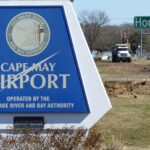CAPE MAY – “We react to change – we don’t respond,” Pastor Jeanette Block said April 21, during a phone interview.
Working in the United Methodist Church since 2000, Block lent her perspective to the history of Methodism in the United States and Cape May County.
According to Block, Methodism in Cape May has surprising origins. During 1810-1811, the pastor of the Cold Spring Presbyterian Church desired to see “improved morals” of Cape May’s settlers. The pastor then invited well known Methodist preachers, Joseph Osborn and William Smith, who traveled the Salem circuit (Cumberland and Cape May counties), to preach. Memucan Hughes, a prominent resident, opened his home for services under Osborn and Smith’s leadership.
In 1837, brothers Israel and John Townsend held services in Cape May, at the Franklin Street schoolhouse, which is now the firehouse. According to church records, it became the “first permanent establishment of Methodism in Cape May.” (https://bit.ly/35jKE0q) Later, in 1844, the members erected a permanent meeting house at the current site.
What does it mean to be a Methodist?
Methodists trace their roots to Englishman John Wesley, born in 1703.
Wesley grew up in a time of change, as Great Britain and Europe struggled into the modern age. While at Oxford University, he and a few friends read the Scriptures together, seeking to lead more disciplined lives, as they studied to become ordained in the Church of England (Anglican). Nicknamed “the Holy Club,” Wesley and his friends laid Methodism’s foundations.
Methodists welcomed women and people of all social standing as equals. Wesley claimed that faith must be lived out and expressed, not confined to Sunday worship. Methodist exuberance was chastised by many Anglican bishops.
Wesley traveled across Great Britain, preaching the Gospel to whoever would listen. Religious revivals spread across England, Wales, and the American colonies.
“I look upon all the world as my parish,” John Wesley penned in his journal, which is dated June 11, 1739.
According to Block, a hallmark of Methodism is that congregations and clergy are “equal.”
American Methodists pushed boundaries along the frontier, conducting mission work among whites, Native Americans, and African slaves. Block said that modern Methodists still grapple with social issues, i.e. tolerance, war, and equality. Although she’s a self-termed progressive, Block recognizes the need for a balance between conservative and liberal congregants.
Those with a story of faith to share for this ongoing series should contact the writer at: rrogish@cmcherald.com.







